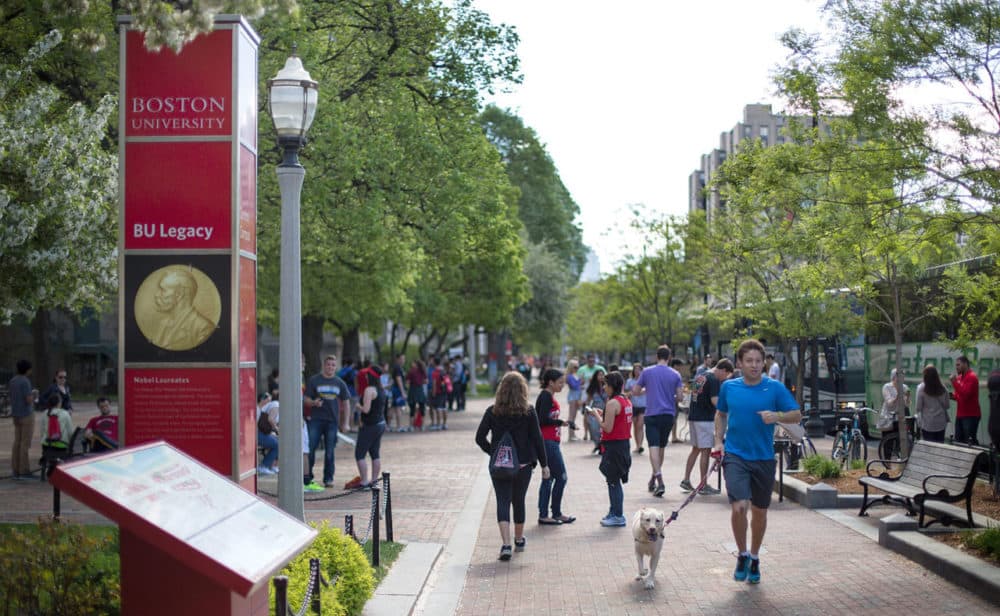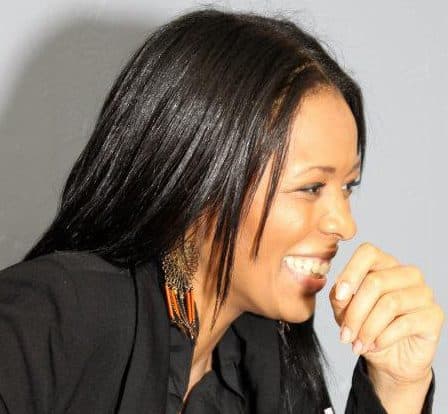Advertisement
Incoming BU Professor Criticized For Tweets On Race; Students Rally To Support

An incoming sociology professor at Boston University says she regrets that her "personal passion about issues surrounding" race has led her "to speak about them indelicately."
Saida Grundy has tweeted several times about race over the last few months.

Some of those tweets caused backlash at Grundy, but she is also finding support on her new campus.
Grundy's troubles began when a website called SoCawlege.com listed tweets she made in March and April.
The one that got the most attention was one she made days after members of a University of Oklahoma fraternity were recorded making a chant using racist language to say they would never accept an African-American member. Grundy tweeted, "Why is white america so reluctant to identify white college males as a problem population?"
The tweets led Boston University to issue a statement on Monday. It said, in part, "We’re offended by such statements."
"...We all know that it's very difficult to make a nuanced argument in 140 characters ... the words we use can often be taken the wrong way when they’re out in such a very public kind of forum."
Nancy Ammerman, a Boston University sociology professor
By Tuesday, BU's tone was more measured. President Robert Brown, in a letter to the BU community, reported that alumni and others "have expressed the view that some of Dr. Grundy's comments are offensive and/or racist."
"We fully appreciate why many have reacted so strongly to her statements," he wrote. "We are disappointed and concerned by statements that reduce individuals to stereotypes.
"I believe Dr Grundy's remarks fit this characterization," Brown continued.
The job at BU is Grundy's first faculty position. Last year, she received her PhD from the University of Michigan, which has one of nation's top sociology programs. The BU committee that chose her was impressed by the quality of her work.
Sociology professor Nancy Ammerman, who served on the committee, predicts Grundy will be a great teacher for people of all backgrounds, including white men, but recognizes that academics tweet at their own peril.
Advertisement
"Twitter's hard, and many of us who are in the academy are trying to exercise some voice in social media and Twitter, but we all know that it's very difficult to make a nuanced argument in 140 characters," Ammerman said. "And we know that the words we use can often be taken the wrong way when they're out in such a very public kind of forum."
Some BU students eagerly await Grundy. Jaimee McGruder is one. As part of the People of Color Coalition at BU, she has helped to mount a Twitter campaign to support Grundy.
"And we really, really hope that Professor Grundy can come to BU and hopefully, maybe educate the largely white population, if they decide to take her class and learn more about these issues and why her tweets were not racist," McGruder said.
As a black woman, McGruder says she has experienced racism firsthand. She grew up in Moss Bluff, a largely white area outside Lake Charles, Louisiana.
"Back home, I used to get beat up for being black," she said. "I was told in elementary school, 'Nobody cares about black people' by other children, by white children. This is something that students of color have to deal with. We're told from the beginning of our lives that we don't matter."
McGruder, a sophomore, says BU is a hard place for students like her. She says there are not a lot of black women role models in the faculty. BU's student body is 3 percent black. Along with Emerson, Northeastern and the Massachusetts College of Art and Design, BU has the lowest percentage of black students among large colleges and universities in Boston. For comparison, 10 percent of students at Amherst College are black. At UMass Amherst, 4 percent of students are black.
"When I first came to BU, I had culture shock, because I'm from Atlanta, and so I had never been around so many white people in my whole life."
Jim Russell, a senior at BU
BU freshman Marwa Sayed, of Everett, has already signed up for Grundy's seminar next year on ethnic, race and minority relations.
"The thing that startled me was all these white males suddenly being worried about a professor grading them unfairly because of how they look," Sayed said. "I wear a hijab. I'm Muslim. I've had professors insinuate before that I was not able to be objective because of my religion, which is really insulting. I'm in biological anthropology, which relies heavily on evolution, and the stereotype is that religious people don't care about evolution, or hate evolution. And so I've had certain people insinuate that I was unable to grasp science."
It's not just students of color who welcome Grundy's arrival. Jim Russell is sorry he won't be able to take a course with her. He's about to graduate.
"When I first came to BU, I had culture shock, because I'm from Atlanta, and so I had never been around so many white people in my whole life," said Russell. "That was crazy for me. Everyone looking like me was a far-out experience, and I was really uncomfortable for awhile, 'cause it's just not what I was used to."
Russell agrees with Grundy's most controversial tweet.
"White males are a problematic population in college," he said. "If you're not at least aware and interested in being open to understanding other people's vastly different life experiences as a white male, then you are part of a problem, and I think that everyone who is really offended by these comments that were said on Twitter clearly don't grasp that all."
Grundy declined to be interviewed for this story. But Tuesday, she issued a statement that said, in part:
"In the past year alone, the inconvenient matter of race has made itself an unavoidable topic of discussion in our country... I regret that my personal passion about issues surrounding these events led me to speak about them indelicately... I am committed to ensuring that my classroom is a space where all students are welcomed."
Correction: An earlier version of this report misstated where Marwa Sayed is from. We regret the error.
Editor's note at 4:35 p.m. Wednesday: After deleting many comments that have violated our community rules for comment discussion, we have decided to close this comment thread.
This article was originally published on May 13, 2015.
This segment aired on May 13, 2015.
